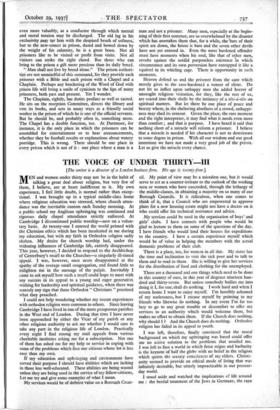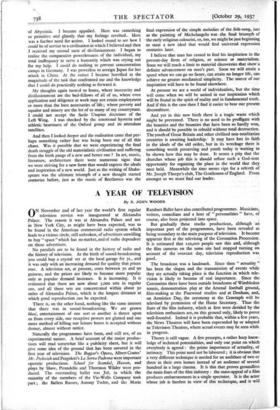THE VOICE OF UNDER THIRTY III
[The writer is a director of a London business firm. His age is twenty-four.] MEN and women under thirty may not be in the habit of talking a great deal about religion, but very few of them, I believe, are at heart indifferent to it. My own experience, I feel little doubt, is normal rather than excep- tional. I was brought up in a typical middle-class home where religious education was stressed, where church atten- dance was the inevitable custom each Sunday morning. At a public school my Anglican upbringing was continued and rigorous daily chapel attendance strictly enforced. At Cambridge I discontinued public worship—now on a volun- tary basis. At twenty-one I entered the world primed with the Christian ethics which has been inculcated in me during my education, but with my faith in Orthodox religion sadly shaken. My desire for church worship had, under the widening influences of Cambridge life, entirely disappeared. This year, however, I decided to respond to. the Archbishop of Canterbury's recall to the Churches—a singularly ill-timed appeal. I was, however, once more disappointed at the apathy of the average small congregation, and found little to enlighten me in the message of the pulpit. Inevitably I came to ask myself how such a recall could hope to meet with any success in its appeal to a young and eager generation wishing for leadership and spiritual guidance, when there was scarcely any sign that these Orthodox " Christians " practised what they preached.
I could not help wondering whether my recent experiences with orthodox religion were common to others. Since leaving Cambridge I have lived in one of the more prosperous parishes in the West end of London. During that time I have never been approached by either the Vicar of my parish or any other religious authority to ask me whether I would care to take any part in the religious life of London. Practically every night I find among my mail appeals from various charitable institutes asking me for a subscription. Not one of them has asked me for my help or service in coping with some of the problems which face our citizens whose lot is less easy than my own.
If my education and upbringing and environment have served their purpose I should have abilities which are lacking in those less well-educated. These abilities are being wasted unless they are being used in the service of my fellow-citizens, Let me try and give some examples of what I mean.
My services would be of definite value on a Borough Coun- cil. My point of view may be a mistaken one, but it would serve to act as a counter-irritant to the outlook of the working men or women who have succeeded, through the lethargy of the middle-classes, in obtaining a majority on so many of our Borough Councils. It is ridiculous, when one comes to think of it, that a Council who are empowered to approve plans for a new housing estate might not have a doctor on it who could offer his technical assistance and advice.
My services could be used in the organisation of boys' and girls' clubs. I have contacts with people who would be glad to lecture to them on some of the questions of the day. I have friends who would lend their houses for expeditions to the country. I have a certain experience myself which would be of value in helping the members with the actual domestic problems of their club.
There is a place, too, for women in all this. My sister has the time and inclination to visit the sick poor and to talk to them and to read to them. She is willing to give her services for the distribution of food and clothing for the unemployed.
There are a thousand and one things which need to be done in this country of ours, in this year of disgrace nineteen hun- dred and thirty-seven. But unless somebody bullies me into doing it I, for one, shall do nothing. I work hard and when I return home I want to enjoy myself. I'm horribly ashamed of my uselessness, but I excuse myself by pointing to my friends who likewise do nothing. In any event I'm far too lazy to go to any great trouble or discomfort to offer my services to an authority which would welcome them, but makes no effort to obtain them. If the Church does nothing, why should I ? And the Church does do nothing. Orthodox religion has failed in its appeal to youth.
I was left, therefore, finally convinced that the moral background on which my upbringing was based could offer me no active solution to the problems that assailed me. I was left to face a world in which force reigns and barbarity is the keynote of half the globe with no belief in the religion which quiets the uneasy consciences of my elders. Christi- anity seemed to provide an ethical mode of living that was infinitely desirable, but utterly impracticable in our present- day world.
I stood aside and watched the implications of life around me : the bestial treatment of the Jews in Germany, the rape of Abyssinia. I became appalled. Here was something so primitive and ghastly that my feelings revolted. Here was a further need for action. I looked round to see how I could be of service to a civilisation in which I believed and then I received my second taste of disillusionment. I began to realise the comparative powerlessness of the individual, my total inadequacy to serve a humanity which was crying out for my help. I could do nothing to prevent concentration camps in Germany. I was powerless to arraign Japan for her attack in China. At the outset I became horrified at the magnitude of the task that confronted me and the knowledge that I could do practically nothing to forward it.
My thoughts again turned to home, where insecurity and disillusionment are the bed-fellows of all of us, where even application and diligence at work may not retain employment or more than the bare necessaries of life ; where poverty and squalor and misery are the lot of so many of my countrymen. I could not accept the facile Utopian doctrines of the Left Wing. I was shocked by the emotional hysteria and athletic heartiness of the Oxford group and its attendant satellites.
And then I looked deeper and the realisation came that per- haps something rather fine was being born out of all this chaos. Was it possible that we were experiencing the final death struggle of the old materialistic civilisation and suffering from the birth pangs of a new and better one ? In art, music, literature, architecture there were numerous signs that we were striving for a new form that would express the ideals and inspiration of a new world. Just as the writing of Shake- speare was the ultimate triumph of a new thought started centuries before, just as the music of Beethoven was the final expression of the simple melodies of the folk-song, just as the painting of Michelangelo was the final triumph of the early religious colourist, so, too, we might be iust beginning -to state a new ideal that would find universal expression centuries later.
I believe that man has ceased to find his inspiration in the present-day form of religion, or science or materialism. Soon we will reach a limit to material discoveries that show definite advancement on man's part. Soon we will attain a speed when we can go no faster, can attain no longer life, can achieve no greater mechanical simplicity. The source of our inspiration will have to be found elsewhere.
At present we are a world of individualists, but the time will come when we will be united in our inspiration which will be found in the spirit of reality and in fundamental truth. And if this is the case then I find it easier to bear our present discomfiture.
And yet in this new birth there is a tragic waste which might be prevented. There is no need to be profligate with the beauties and the bounties that have been so hardly won, and it should be possible to rebuild without total destruction. The youth of Great Britain and other civilised non-totalitarian countries is awaiting leadership: It may have lost its faith in the ideals of the old order, but in its wreckage there is something worth preserving and youth - today is waiting to be shown how this may be done. It seems a pity that the churches whose job this is should refuse such a God-ient opportunity for regaining the place in the world that they once held. Meanwhile the time seems ripe for a rebirth of Mr. Joseph Thorpe's club, The Gentlemen of England. From amongst us we must find our leader.



























































 Previous page
Previous page